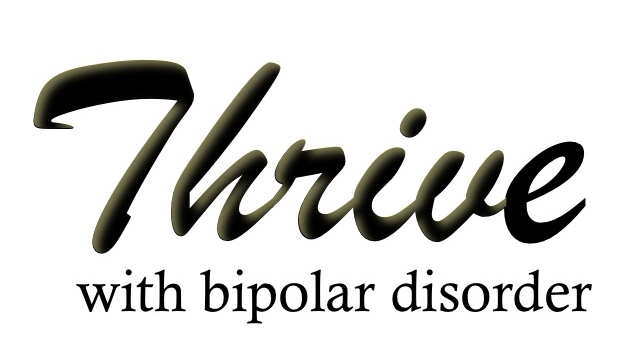One of my goals is to normalize bipolar disorder by using myself as an example of what “normal” mania looks like.
Fifteen years ago, the mania I experienced fit the diagnosis of bipolar disorder perfectly to the extent that I was quoted by my psychiatrist to be used in some textbooks for higher education.
My experiences were normal for mania, not special or extraordinary at all.
Here I will share those experiences with the hope that it gives you the opportunity to feel normal and so you know that you are not alone.
Because this is educational, I will take apart and expose my experience of mania by:
- Using the diagnostic criteria of the DSM IV (the guide book used to diagnose mental illness)
- Type of Mania
Hypomania: mild mania that does affect functioning but one is still able to function
Full-Blown-Mania: severe mania that fully disrupts the ability to function and take care of yourself
My Hypomania
that grew into full-blown mania
Hypomania came into my life when I was fifteen years old and lasted for a few months until it peaked in full-blown mania shortly after I turned sixteen.
Diagnostic Criteria of Mania:
- Mood that is elated, expansive, or irritable.
I was excited by EVERYTHING in life during my hypomania. The slightest idea felt brilliant to me and could lead me to several minutes of pure joy until the next brilliant idea.
Behavior: My energy was like taking the sun into a pitch black cave. It blinded people. People described me as bouncing off the walls. Yet this was pretty normal for me, so no one noticed that anything was wrong. At this time, I was not unusually irritable for a teenager.
- Inflated self-esteem or grandiosity.
I felt truly important and special. However, I did not feel more important or more special than other people (human beings as a whole…I definitely felt more special than the people I didn’t like and those who were mean to me). I believed that I existed for a specific purpose chosen by God and that I am a prophet. Yet, I didn’t believe that I am any more chosen by God than anyone else, but during that time my energy and focus was on understanding God’s message.
I experienced Invincibility in the form of fearlessness. I did not believe I could fly and breathe under water or have any super powers, yet I did believe that I was a super human who was capable of using all of my potential and brain power and that those powers were far greater than what most people are aware and capable of.
During hypomania, the rules simply did not apply to me. It was NOT that I wanted to break the rules, I just felt so free from consequences to the point that I did not even consider the possibility of consequences in my actions.
Behavior: I was in high school…so I couldn’t do all that much with my belief that I was a prophet, I was only 15 when I had hypomania. So I did what any normal prophet would do…I led my people. I did not feel that my Chemistry teacher was effectively teaching his class so I led a walk-out and the entire class followed. I personally did not return to the class for two weeks until the principal and teacher met with me to discuss how he could improve as a teacher.
- Not needing sleep. Unable to sleep.
I stayed up all night studying and decoding the bible and other religious texts throughout the world, as well as studying quantum physics. I believed I was uncovering messages from God on how to unite all people. When I wasn’t studying, I drew intricate spiritual drawings. When I was tired, I slept in school because it was so slow and boring. Yet at the time falling asleep in class was considered relatively normal for teenagers.
- Pressure to talk. Unable to stop talking.
Yep, that was me. But it was not unusual for me at fifteen and sixteen.
- Racing thoughts.
I had multiple thoughts traveling through my mind at once from an infinite number of perspectives. At times my thoughts would get jumbled and would be difficult to express. It was very difficult for me to focus in on one thought at a time.
Behavior: As a result, school was too slow. The world around me could not keep up with me and I felt very bored in school. Yet, at the same time I had more thoughts than I could express. I spent my time in school drawing these intricate drawings that integrated ancient spiritual symbols (that I did not even know I was using) because it was the only way to feel quiet in my mind and to focus all of my thoughts. In fact, my school work and exams were covered by this art.
- Obsessed with a goal. Unable to stop goal directed activity.
Yes. I was secretly obsessed with being a prophet and put all of my energy into learning from God.
- Excessive involvement in pleasurable activities that have painful consequences. This is where hypomania and full-blown mania begin to blur.
My sex drive was through the roof and I had difficulty containing it. My values kept me from acting out my sexual impulses. To keep myself from having sex, I took up boxing.
Because I was so sexually excited and had no income, I used my sexuality to try to get things I could not afford, like a car.
I went to a car dealership convinced that that the dealer would want to give me a car because I was “Hot!”. It didn’t work, but I got him to drive home with me and try to convince my parents to buy me the car.
I was a brand new driver driving down surface streets at 80mph without even noticing it or without even feeling that I was going fast.
And I was just old enough to be dating. When I met a guy, I unloaded all of my emotional baggage on him on our first date, then was very hurt when he didn’t want to date me.
If I had had money, I would have spent it ALL. And then I would have gone into incredible debt. If the internet had existed, I would have stolen my parents credit cards and bought EVERYTHING. I was lucky that I was only 15-16 when mania came into my life.
Full-Blown Mania
I was not hospitalized because my mania peaked while my family was on vacation and there was no safe place at the time to contain me, other than jail…which was considered for my safety, but not the chosen option. Therefore, I experienced the full experience of mania.
I characterize full-blown mania by the severity of symptoms and the delusions I experienced. During full-blown mania I went from wanting to serve God to being violently angry. I was completely out of control both emotionally and physically. I went from being fearless to completely paranoid and delusional.
I should have been hospitalized. However, help did not arrive in my life until I had crashed deeply into a depression where I no longer felt alive because I could no longer think or feel anything.
What you are about to read is full of pain. I share this to give hope to others who have experienced mania. I want you to know that you are not bad or crazy.
Actions I took during full-blown mania:
- I cursed at and told off the highway patrol man who gave my father a ticket for speeding.
- From my vacation, I contacted every boy I had a phone number for in my high school (yet didn’t care about) and aggressively pursued having sex with them as soon as I returned home. I scared them so badly that not one boy took me up on it.
- I got in a fist fight with my friend in my vacation home.
- I threatened to beat up a child for splashing water on my friend.
- Every emotion I ever had came exploding out of me uncontrollably.
- I viciously attacked my mom verbally and physically with rage and hate. I was so angry at her. I wanted to hurt her. I wanted her to feel the pain that I felt. And I wanted her to help me.
Delusions (beliefs that could not be disproven by anyone while I was manic, yet they were not real) = Psychosis:
- I believed I was to be the mother of the messiah and needed to be impregnated by my best friend.
- I believed I was gang-raped by the kids in my junior high who emotionally hurt me.
- I believed my mom was trying to hurt me, so I called the police on her. (This is how the police got involved and wanted to put me in jail for my safety.)
- I believed I was locked in a room so I found a hammer and destroyed the door. It turns out that the door was not locked.
- I believed I was responsible for my grandmother’s death and my mother’s cancer.
This is painful to share, no matter how many times I have shared it. Nonetheless, I share it because I am not alone in this experience. So many people have experienced this and I want them to know that they are not bad, wrong or crazy…they lost control to mania. This experience is normal for mania.












